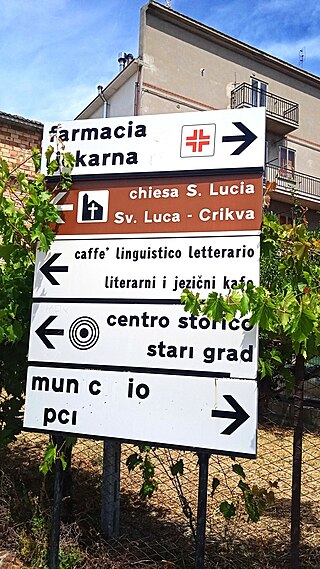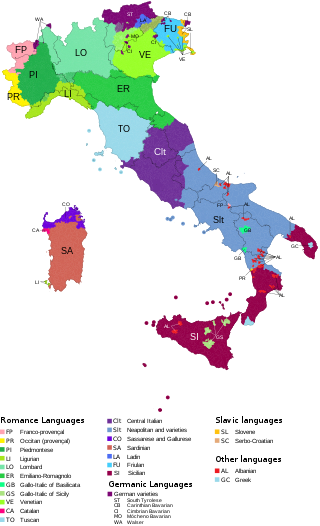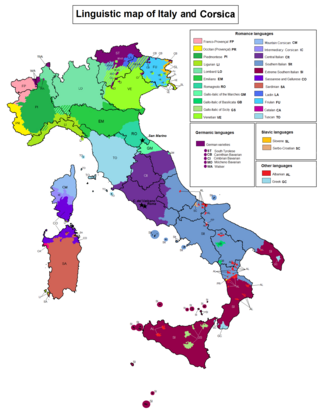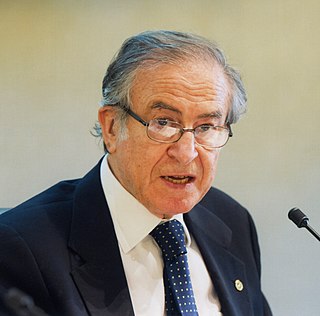Notes
- ↑ Renzi Archived 2012-11-28 at the Wayback Machine
- ↑ Renzi Archived 2009-04-15 at the Wayback Machine
Lorenzo Renzi (Vicenza, 1939), Italian linguist and philologist.
Lecturer of Romance philology at the Paduan Athenaeum, he has chaired the Società Linguistica Italiana. [1]
He is the author of several works in the field of linguistics. [2]
Eduardo Blasco Ferrer was a Spanish-Italian linguist and a professor at the University of Cagliari, Sardinia. He is best known as the author of several studies about the Paleo-Sardinian and Sardinian language.

Sardinian or Sard is a Romance language spoken by the Sardinians on the Western Mediterranean island of Sardinia.
Regional Italian is any regional variety of the Italian language.

Slavomolisano, also known as Molise Slavic or Molise Croatian, is a variety of Shtokavian Croatian spoken by Italian Croats in three villages – Montemitro, Acquaviva Collecroce and San Felice del Molise – in the province of Campobasso, in the Molise Region of southern Italy. There are fewer than 1,000 active speakers, and fewer than 2,000 passive speakers.
Mario Alinei was an Italian linguist and professor emeritus at the University of Utrecht, where he taught from 1959 to 1987. He was founder and editor of Quaderni di semantica, a journal of theoretical and applied semantics. Until 1997, he was president of Atlas Linguarum Europae at UNESCO.

Francesco de Sanctis was a leading Italian literary critic and scholar of Italian language and literature during the 19th century.

The languages of Italy include Italian, which serves as the country's national language, in its standard and regional forms, as well as numerous local and regional languages, most of which, like Italian, belong to the broader Romance group. The majority of languages often labeled as regional are distributed in a continuum across the regions' administrative boundaries, with speakers from one locale within a single region being typically aware of the features distinguishing their own variety from one of the other places nearby.
The primary languages of Calabria are the Italian language as well as regional varieties of Extreme Southern Italian and Neapolitan languages, all collectively known as Calabrian. In addition, there are speakers of the Arbëresh variety of Albanian, as well as Calabrian Greek speakers and pockets of Occitan.

Gallo-Italic of Sicily is a group of Gallo-Italic languages found in about 15 isolated communities of central eastern Sicily. Forming a language island in the otherwise Sicilian language area, it dates back to migrations from northern Italy during the reign of Norman Roger I of Sicily and his successors.

Gianfranco Pasquino is an Italian political scientist. Professor Emeritus of Political Science at the University of Bologna and Senior Adjunct Professor at SAIS-Europe (Bologna). He studied at the University of Turin under Norberto Bobbio and specialized under Giovanni Sartori at the University of Florence. In his professional life, he has been associated with the University of Florence, Harvard University, University of California, Los Angeles and the School of Advanced International Studies in Washington, DC and Fellow of Christchurch and St Antony's at Oxford and Life Fellow of Claire Hall, Cambridge.
Alberto Melloni is an Italian church historian and a Unesco Chairholder of the Chair on Religious Pluralism & Peace, primarily known for his work on the Councils and the Second Vatican Council. Since 2020, he is one of the European Commission's Chief Scientific Advisors.
Carla Bazzanella was an Italian linguist.

Massimo Bergami is a full professor of organizational behavior at the University of Bologna and dean of Bologna Business School. He is married with Ludovica Leone and father of Giovanni Romano.
Luca Serianni was an Italian linguist and philologist.

Pietro Trifone, is an Italian linguist.
Maurizio Trifone is an Italian linguist and lexicographer.
Emidio De Felice was an Italian linguist and lexicographer.
Nicoletta Maraschio is an academic teacher of "History of Italian Language" at University of Florence. She was the first woman in charge of Accademia della Crusca, from 2008 to 2014, succeeding Francesco Sabatini.

Alberto Quadrio Curzio is an Italian economist. He is Professor Emeritus of Political Economy at Università Cattolica del Sacro Cuore, Milan, President Emeritus of the Accademia Nazionale dei Lincei and President of the International Balzan Foundation "Prize".
Gianfranco Folena was an Italian linguist, philologist, and academic.